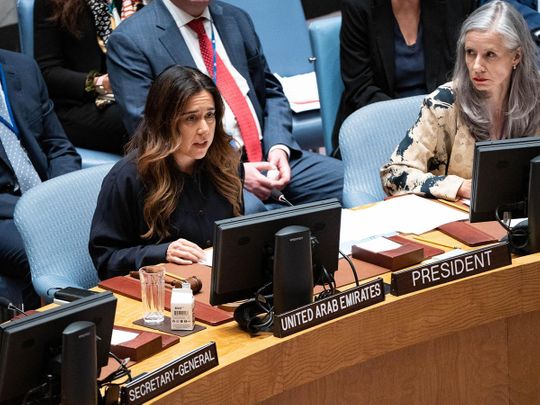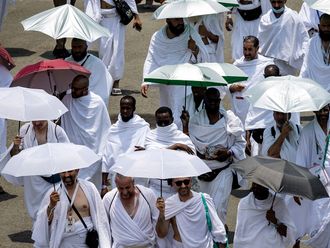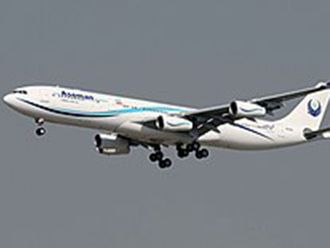
AL ARISH, Egypt: UN Security Council ambassadors travelled to Egypt on Monday to meet Gazan victims of the war between Israel and Hamas, days after the United States blocked a ceasefire resolution.
The informal one-day trip organised by the United Arab Emirates came amid a spiralling humanitarian crisis in war-torn Gaza, described as a “graveyard” by United Nations Secretary-General Antonio Guterres. Around a dozen ambassadors took part from countries including Russia and Britain.
Also read
- 10 Emirati female volunteers depart for Gaza to join the UAE field hospital
- Outrage as Israeli bombing destroys Gaza's oldest 7th century Omari Mosque
- Gaza health situation is ‘catastrophic’: WHO chief
- Heavy fighting across Gaza as Israel presses ahead with renewed US military and diplomatic support
But the US, which vetoed the Security Council resolution calling for a ceasefire on Friday, did not send a representative and neither did France.
Speaking at the start of the trip, UAE envoy Lana Nusseibeh said the trip was not official Security Council work, and members were taking part on their own “national and personal” initiatives.
The UAE arranged the trip to Rafah — where limited humanitarian aid and fuel deliveries have crossed into Gaza — as the 15-member council negotiates a UAE-drafted resolution that demands the warring parties “allow the use of all land, sea and air routes to and throughout” Gaza for aid.
It would also establish a UN-run aid monitoring mechanism in Gaza Strip. It was not immediately clear when the draft resolution could be put to a vote.
UAE UN Ambassador Lana Nusseibeh said the aim of the visit was “to learn first-hand what is needed in terms of a humanitarian operations scale-up that meet the needs of the Palestinian people in Gaza.”
NOT AN OFFICIAL VISIT
She noted it was not an official Security Council visit.
The envoys visited a hospital in Al Arish near the Rafah border crossing with Gaza, treating people who had been evacuated from the conflict.
Among the people they met was Wafaa Asaad, a 27-year-old from Gaza who was heavily pregnant when her house was hit by an Israeli strike, killing her husband and injuring her two daughters.
She was evacuated to Egypt for medical treatment and had an arm and leg amputated, but miraculously managed to give birth just hours after crossing the border, her sister Alaa told AFP.
“Our message to the UN is we want the war to stop,” Alaa said, her newborn niece laying on a bed beside her.
Ecuador’s envoy Jose de la Gasca told AFP he was “destroyed” by the visit to the hospital.
“I just met a young mother who lost a kid and has another little girl who is wounded,” he said.
“I dont ever want to see again what I have just seen. It’s horrible.”
The diplomats were later due to visit the Rafah crossing, the only gateway into Gaza.
Departures via the crossing are tightly controlled, with only foreign nationals and severely wounded people allowed to leave Gaza in most circumstances.
‘Lack absolutely everything’
Philippe Lazzarini, head of the UN’s Palestinian refugee agency UNRWA, briefed the envoys on the humanitarian situation before he headed to Gaza for his third visit since the start of the war in October.
There is “deep frustration, disappointment and some outrage... (that) we can’t even reach a consensus for a ceasefire,” Lazzarini said.
“There is no real safe place in the Gaza Strip. Even the UN premises currently hosting more than one million people have been hit,” he added.
“Hunger is prevailing in Gaza. More and more people haven’t eaten for one day, two days, three days... people lack absolutely everything.”
GENERAL ASSEMBLY VOTE ON TUESDAY
The UN General Assembly will meet on Gaza on Tuesday at the request of Arab and Organisation for Islamic Cooperation (OIC) states. The 193-member body is likely to vote on a draft resolution demanding an immediate humanitarian ceasefire, diplomats said.
In October the assembly adopted a resolution — 121 votes in favor, 14 against and 44 abstentions — calling for “an immediate, durable and sustained humanitarian truce leading to a cessation of hostilities.”
The vast majority of the Palestinian enclave’s 2.3 million people have been driven from their homes. Guterres told the Security Council on Friday: “Half the people of the north and more than one third of displaced people in the south are simply starving.” The UN Office for the Coordination of Humanitarian Affairs said that 100 trucks carrying humanitarian supplies entered Gaza from Egypt on Sunday, the same number as the previous day.
It noted that was “well below” the daily average of 500 truckloads, including fuel, that entered every working day prior to Oct. 7.
“The conditions for the effective delivery of humanitarian aid no longer exist,” Guterres said on Friday. “The crossing point at Rafah was not designed for hundreds of trucks and is a major bottleneck.”
The UN has been pushing for the opening of the Kerem Shalom crossing, controlled by Israel. Israel has agreed to allow it to be used for inspections, but not to enter Gaza.
Trucks would be inspected there before entering Gaza from Rafah, about 3km (2 miles) away.
The UAE also invited incoming Security Council members Algeria, Guyana, Sierra Leone, Slovenia and South Korea, who start their two-year terms on January 1, replacing Albania, Brazil, Gabon, Ghana and the UAE






